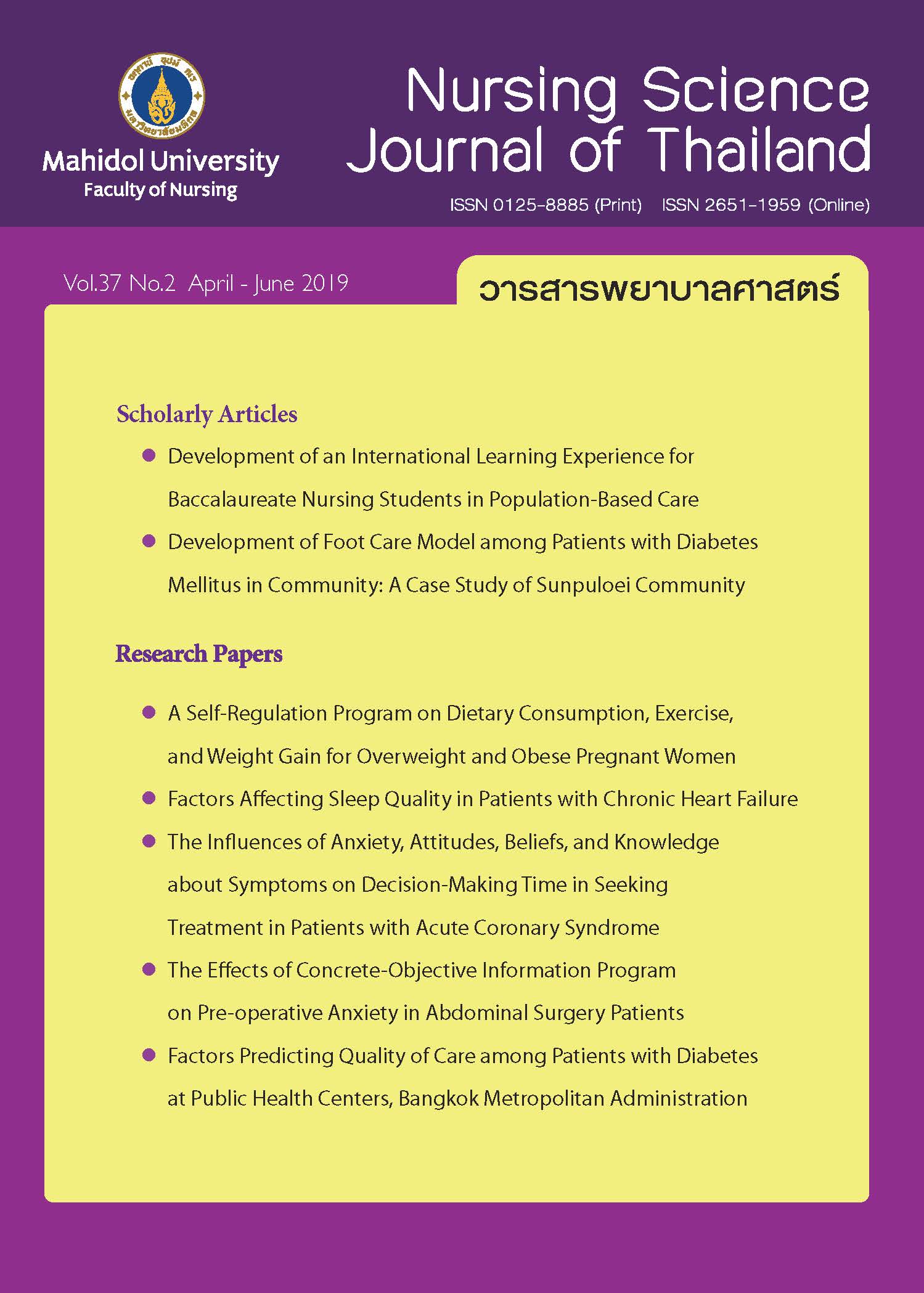Development of an International Learning Experience for Baccalaureate Nursing Students in Population-Based Care
Main Article Content
Abstract
Purpose: The purpose of this article was to describe international learning experience titled the Thailand International Learning Experience which was provided baccalaureate nursing students the opportunity to explore population-based care through a comparative clinical learning experience.
Methodology: The international learning experience was designed within the structure of a four-week clinical course where baccalaureate nursing students from Oregon Health & Science University (OHSU) joined in collaborative learning with nursing students at Mahidol University Faculty of Nursing (MU FoN). Learning outcomes were designed to meet essential population-based nursing content and curricular requirements. To meet learning outcomes each student was required to choose a health care issue focusing on a population, which included identifying the population context and practice setting. Demographic and geographic conditions were defined, which considered the impact of potential socio-economic, or urban/rural variances. Participating in clinical practice, attending presentations and interviews with population-based experts provided students with foundational information which they used to evaluate nursing performance, roles, and nursing outcomes in population-based care. The review of evidence-based peer-reviewed nursing journals from both the United States and Thailand were utilized to increase the students’ knowledge. To demonstrate evidence of competence of required learning outcomes, students prepared an individual presentation and paper outline that were evaluated by both MU and OHSU nursing faculty.
Outcomes: Nursing students had the opportunity to increase their knowledge of nursing practice in population-based care through a comparative international learning experience.
Article Details
Copyright Notice: Nursing Science Journal of Thailand has exclusive rights to publish and distribute the manuscript and all contents therein. Without the journal’s permission, the dissemination of the manuscript in another journal or online, and the reproduction of the manuscript for non-educational purpose are prohibited.

Disclaimer: The opinion expressed and figures provided in this journal, NSJT, are the sole responsibility of the authors. The editorial board bears no responsibility in this regard.
References
2. Edmonds ML. An integrative literature review of study abroad programs for nursing students. Nurs Educ Perspect. 2012;33(1):30–4.
3. Stebleton MJ, Soria KM, Cherney BT. The high impact of education abroad: college students’ engagement in international experiences and the development of intercultural competencies. Frontiers: The Interdisciplinary Journal of Study Abroad. 2013;22:1–24.
4. Johns A, Thompson CW. Developing cultural sensitivity through study abroad. Home Health Care Manag Pract. 2010;22(5):344–8.
5. Brown CL. Linking public health nursing competencies and service-learning in a global setting. Public Health Nurs. 2017;34(5):485–92.
6. Philips L, Bloom T, Gainey T, Chiocca E. Influence of short-term study abroad experiences on community health baccalaureate students. J Nurs Educ. 2017;56(9):528–33.
7. Institute of Medicine (IOM). The future of nursing: leading change, advancing health [Internet]. Washington, DC: The National Academies Press; 2011. Available from: https://www.ncbi.nlm.nih.gov/books/NBK209880/pdf/Bookshelf_NBK209880.pdf.
8. Ruddock HC, Turner de S. Developing cultural sensitivity: nursing students’ experiences of a study abroad programme. J Adv Nurs. 2007;59(4):361–9.
9. Levine M. Transforming experiences: nursing education and international immersion programs. J Prof Nurs. 2009;25(3):156–69.

